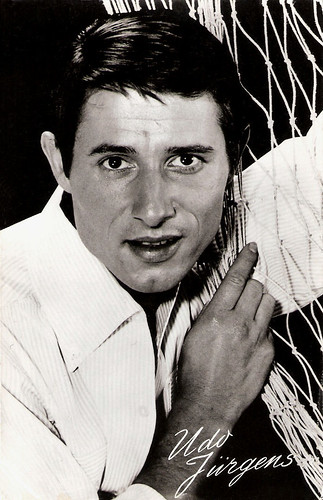
Dutch postcard by Uitg. en druk. 't Sticht, Utrecht, no. AX 6560.

Spanish postcard by Oscarcolor, no. 373.
Cross-dressing farces
Udo Jürgens was born as Udo Jürgen Bockelmann in Klagenfurt, Austria in 1934. His wealthy family lived in Schloss Ottmanach (Ottmanach Castle), where he grew up with his brothers John, later a businessman, and Manfred, now a respected painter.
In 1948, Udo started studying piano, harmony, composition and singing at the Conservatory of Klagenfurt. Just 16, he won a composer contest organized by Austria's public broadcasting channel ORF with the song 'Je t'aime' (1950). His success built from there over the next decade. In 1957 he performed a song in the Schlagerfilm Die Beine von Dolores/Night Club (Géza von Cziffra, 1957) starring Germaine Damar, and a year later he appeared in the crime comedy Lilli - ein Mädchen aus der Großstadt/Lilli, a girl from the big city (Hermann Leitner, 1958) with Adrian Hoven.
He was one of the participants of the German delegation that won the Knokke Song festival in Belgium in 1960. His song 'Jenny' became a number 1 hit in the Belgian charts. In 1961, he wrote the worldwide hit 'Reach for the Stars', sung by Shirley Bassey. That year he appeared in the Schlagerfilm Und du mein Schatz bleibst hier/And You My Dear, Stay Here (Franz Antel, 1961), starring Vivi Bach.
In the following years he could be seen in more of such mediocre fare, like in the cross-dressing farces Unsere tollen Tanten/Our Great Aunts (Rolf Olsen, 1961), Unsere tollen Tanten in der Südsee/Our Great Aunts in the Southsea (Rolf Olsen, 1963), Unsere tollen Nichten/Our Great Nieces (Rolf Olsen, 1963) all co-starring Günther Philipp and Gus Backus, and Drei Liebesbriefe aus Tirol/Three love letters from Tyrol (Werner Jacobs, 1962) with Ann Smyrner. In 1964, he represented Austria for the first time at the Eurovision Song Contest with the song 'Warum nur warum?' finishing sixth. The UK participant, Matt Monro, was impressed with the melody and covered the song with English lyrics such as 'Walk Away'. This version reached number four on the UK Singles Chart and number 23 on the US Billboard Hot 100.
Jürgens' song 'Sag ihr, ich lass sie grüßen' came fourth in 1965's contest. In 1966 he finally won the Eurovision Song Contest with 'Merci, Chérie'. This song became an English-language hit for Vince Hill, another cover by Monro, and one of Jürgens' most recognised compositions. Jürgens' version alone sold over one million copies, and he was awarded a gold disc by Deutsche Vogue. In 1966, he also played in the Italian-German musical La battaglia dei mods/Crazy Baby (Franco Montemurro, 1966) with Ricky Shayne. But in the following decades, he mostly appeared on TV for the cameras.

Italian postcard. Photo: SAAR.

German postcard by Filmbilder-Vertrieb Ernst Freihoff, Essen, no. AX 7081. Photo: Ariola.
The man with the bassoon
During the 1970s, Udo Jürgens wrote some of his most famous songs, like 'Griechischer Wein' (1975, Come Share The Wine), 'Aber bitte mit Sahne' (1977, I'll have whipped cream with that), and 'Mit 66 Jahren' (1978, At 66). He is credited with broadening German-language pop music beyond the traditional post-war Schlager by infusing it with a modern pop appeal.
One of his biggest successes was 'Buenos Días, Argentina', which he performed together with the German national football team in 1978. In 1979, he released a disco album entitled 'Udo '80'. It produced a hit song 'Ich weiß was ich will' (I Know What I Want).
The following Udo ’80 tour became with 330.000 visitors in 110 concerts his most successful concert tour till then. Three years later he broke this record with more than 400.000 visitors in 123 concerts. His Ohne Maske tour in 1989 attracted 410.000 visitors during 107 concerts. A new record made his 1994-1995 tour with about 500.000 visitors in 140 concerts.
In 2007, the musical 'Ich war noch niemals in New York' (I've never been to New York) opened in Hamburg's Operettenhaus. It weaved songs by Jürgens into a familial storyline. In 2011 he played the lead in the TV mini-series Der Mann mit dem Fagott/The Man with the Bassoon (Miguel Alexandre, 2011). The mini-series was based on Jürgens’ own autobiographical novel and won two awards in Germany and Austria.
Udo Jürgens’ exceptionally tuneful compositions and sophisticated arrangements continue to attract fans of all ages. Even in his 70’s he filled the largest concert venues in Germany, Austria, and Switzerland. He married and divorced twice: first to Erika Meier (1964-1989) and then to Corinna Reinhold (1999-2006). He had two children from his first marriage, singer, actor and DJ John Jürgens (1964), and actress Jenny Jürgens (1967). He also had two illegitimate children, Sonja and actress Gloria Burda.

German postcard by Filmbilder-Vertrieb Ernst Freithoff, Essen, no. 6926.
Swiss promotion card by Ariola. Photo: M. Bockelmann.
Scene from Unsere tollen Tanten/Our Great Aunts (1961) with Trude Herr. Source: Sablinef (YouTube).
Sources: Dave Thompson (AllMusic), Udo Jürgens.de, Wikipedia and IMDb.
This post was last updated on 30 November 2024.
No comments:
Post a Comment